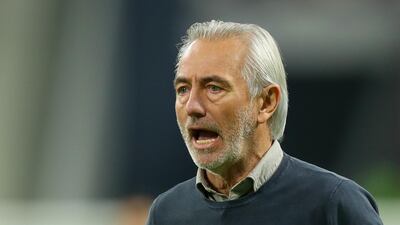Bert van Marwijk has been dismissed as UAE manager after less than nine months in charge.
The Football Association confirmed on Wednesday via a brief statement that the Dutchman, appointed in March on an initial three-year contract, was relieved of his duties, with his successor to be appointed “in the coming days”.
The UAE exited the Gulf Cup of Nations on Monday at the group stage having suffered two defeats in their final two matches. The search has begun for a fourth national team manager in two and a half years.
Van Marwijk replaced Alberto Zaccheroni almost two months following the UAE’s run to the Asian Cup semi-finals, on home soil, and was charged with guiding the team to a second World Cup and first since 1990.
He began qualification for the 2022 tournament with victories against Malaysia and Indonesia, before falling to successive defeats to Thailand and then Vietnam, the last coming in Hanoi three weeks ago. As it stands, the UAE sit fourth in a five-team Group G, five points off Vietnam at the summit although they do have a game in hand. Only the group winners are guaranteed to progress to the third round.
Van Marwijk, 67, will not be afforded the chance to turn around the campaign, though, and leaves the UAE long before had been anticipated. Upon his appointment, he was tasked with overturning an aging squad and succeeded in introducing a number of young players.
Van Marwjik, who led the Netherlands to the 2010 World Cup final, was chosen for the job primarily because he masterminded Saudi Arabia’s qualification for last year's tournament – their first appearance at a global finals in 12 years. However, he was dismissed almost immediately after their place in Russia was secured.
He did go on to manage at the tournament, taking charge of Australia on a short-term contract, although the then-Asian champions failed to make it out of their group. He leaves the UAE having won three of his seven competitive matches, losing the other four.


